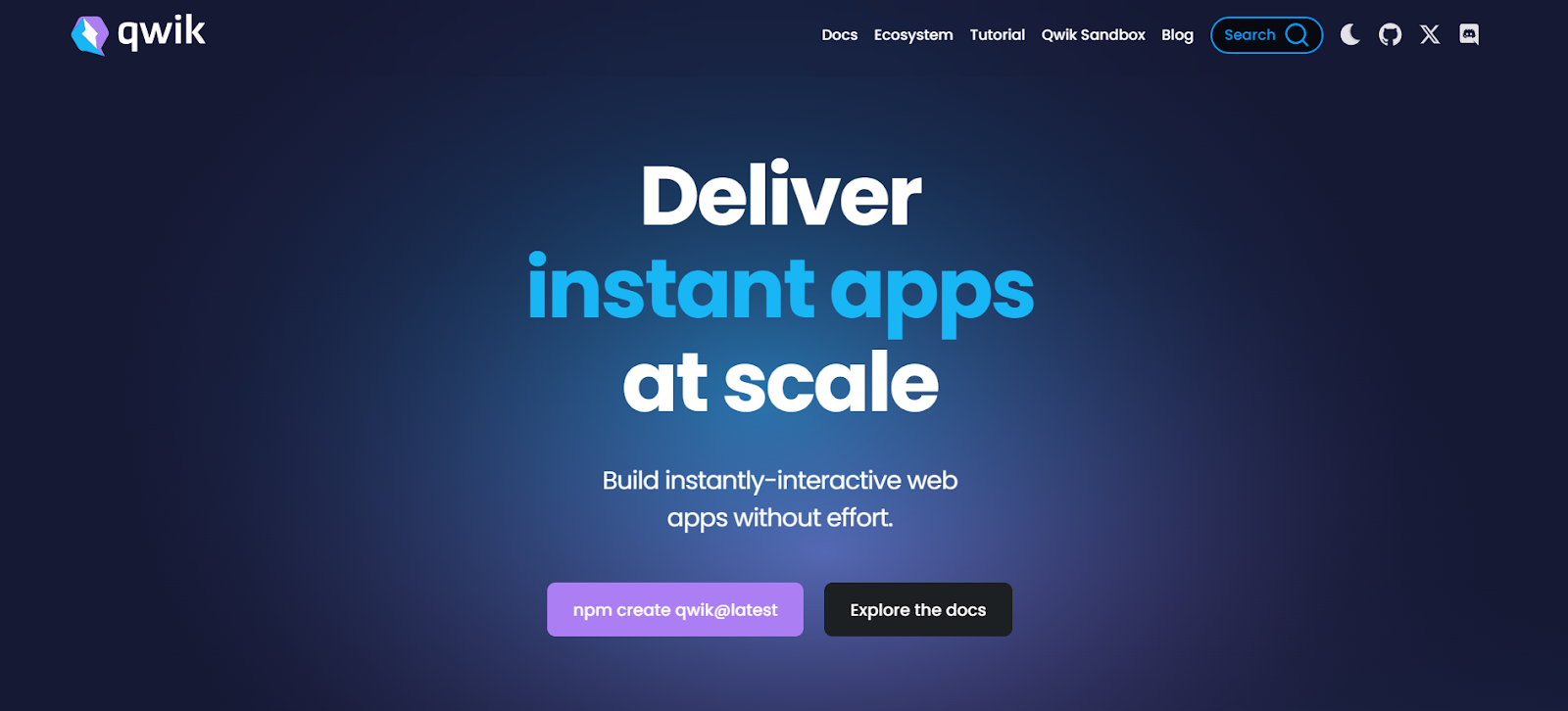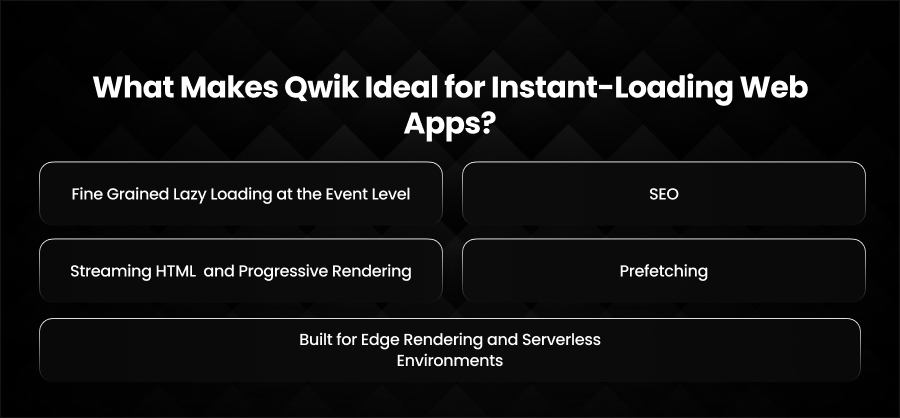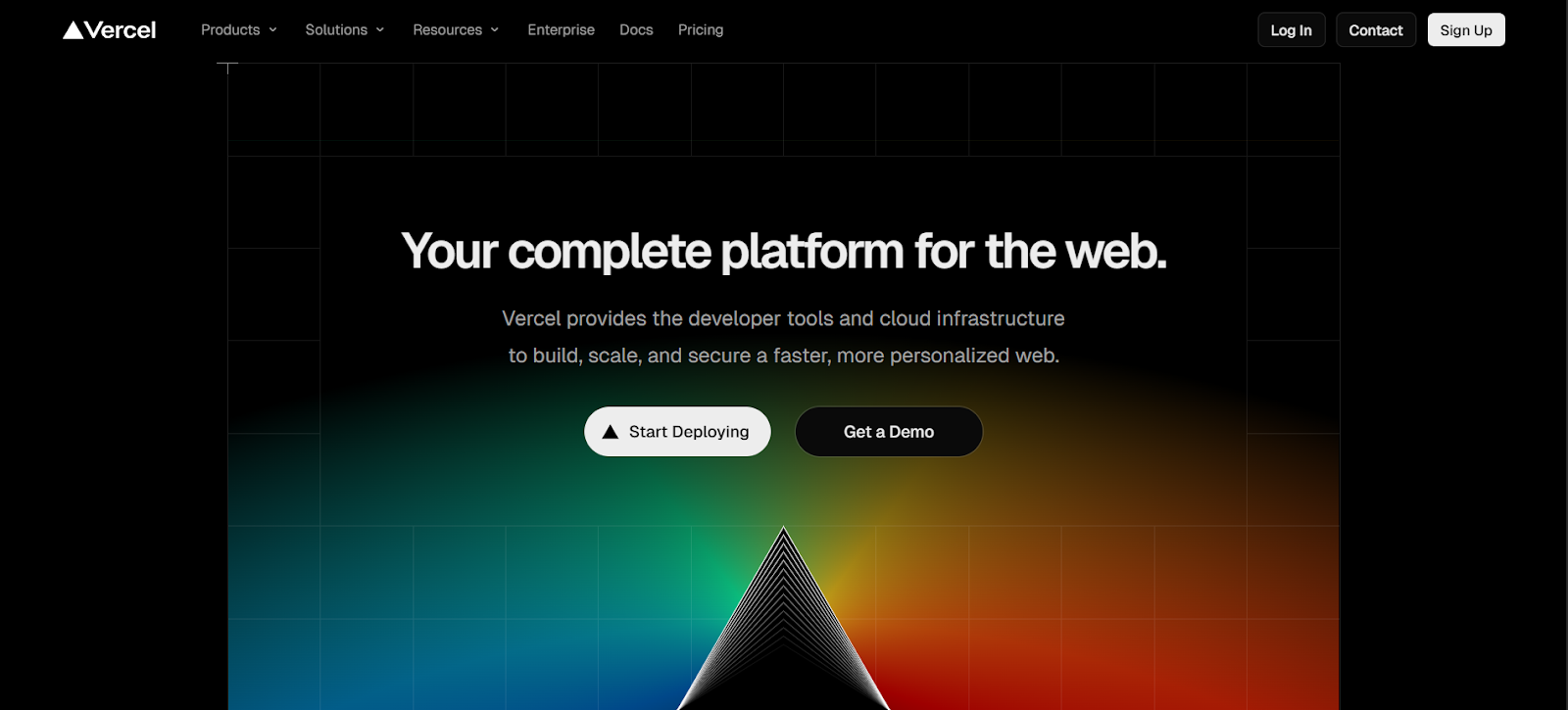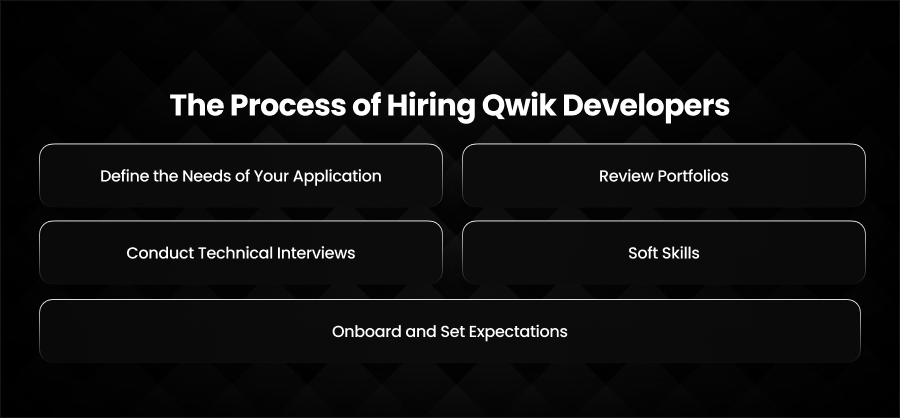Although Qwik is not as popular as React, because fewer than 0.1% of websites use it. However, it’s quickly gaining traction because of its unique design and focus on speed. This is because modern web users expect speed and seamless experiences on any device and connection.
Therefore, this is where Qwik can help. Qwik has a core focus on instant-loading web apps and optimized user experience. Hence, businesses can stand out in the market by hiring Qwik developers who can offer excellent performance.
So, in this guide, we will look a what Qwik is and how you can hire the best Qwik developers that can build high performance and fast web apps.
Qwik: What is it?

Qwik is a next generation JavaScript framework. Moreover, Qwik is developed to solve one of the most persistent problems in web development: performance. Qwik has a different approach compared to traditional frameworks like React or Vue. While these frameworks often require significant JavaScript execution on the client side to hydrate the application, Qwik avoids this bottleneck entirely through a concept called resumability.
Most modern frameworks depend on hydration. After a server renders the HTML and sends it to the client, hydration comes into play, and it re-runs the JavaScript to reconnect the UI components to their logic and state. Moreover, this process is often invisible but expensive. Hydration requires downloading and executing large bundles of JavaScript. This can slow down the time it takes for users to interact with the app. Also, this delay can be especially damaging on mobile devices or low bandwidth connections.
Hence, Qwik flips this process on its head with a new architectural model that prioritizes instant interactivity from the very first byte delivered.
Resumability is Qwik’s defining feature. Instead of hydrating the app, Qwik serializes the app’s state on the server during rendering and resumes it on the client exactly where it left off. Hence, this means no execution of component logic. Moreover, it also means no unnecessary JavaScript is downloaded upfront, and no wasteful hydration process.
What Makes Qwik Ideal for Instant-Loading Web Apps?

Fine Grained Lazy Loading at the Event Level
Most frameworks offer lazy loading at the route or component level. However, Qwik takes it much further by supporting fine grained lazy loading, even down to the event handler level. Hence, this means that JavaScript for specific UI interactions only loads when the user triggers them. For example, the logic behind a signup button will not be fetched until the user hovers over or clicks it. Moreover, this hyper efficient approach ensures that users never download code they don’t need. Hence, this keeps your app fast and lean.
Built for Edge Rendering and Serverless Environments
Qwik is built for the modern web, where applications are increasingly deployed on the edge using platforms like AWS Lambda. Moreover, its resumability model aligns perfectly with edge computing principles, and processing happens closer to the user and improving responsiveness. Hence, because Qwik applications can be rendered and resumed at the edge, they scale effortlessly and provide quick experiences to users no matter where they are in the world.
Streaming HTML and Progressive Rendering
Instead of waiting for the entire page to be available, Qwik may send down portions of a web page gradually since it supports server side streaming of HTML. As a result, important content, such as headers and banners, can appear instantly while other parts load in the background. Moreover, streaming combined with resumability enables progressive rendering without blocking user interaction. So, this not only improves perceived performance but also provides a smoother and more fluid user experience.
Prefetching
Qwik takes a proactive approach to performance with smart prefetching. Instead of waiting for user interaction, it intelligently predicts what users are likely to do next and begins preloading the required JavaScript behind the scenes. For instance, if a user hovers over a navigation menu, Qwik can preload the required JavaScript to render the submenu. Hence, this behavior allows Qwik to deliver near instant interactions without overloading the network or bloating the initial load. Hence, it’s the perfect balance between speed and efficiency, ensuring that users get what they need before they even realize they need it.
SEO
Because Qwik uses server side rendering by default and avoids heavy client side hydration, it offers exceptional support for SEO and Core Web Vitals. Hence, search engine crawlers can easily index Qwik apps because the content is fully rendered in HTML without relying on JavaScript execution. At the same time, users benefit from fast page loads and instant interactivity.
Benefits of Hiring Qwik Developers
Expertise in Performance First Architecture
As Qwik has resumability and lazy loading features, developers need to think about how to structure the code and interactions for optimal load times. Hence, skilled Qwik developers understand how to architect an application so that only the essential code is delivered at the right moment.
Quicker Time to Market
You can significantly lower the learning curve involved in implementing a new framework by hiring developers who are experienced with Qwik’s distinctive concepts and technology. Also, Qwik’s development model enables modular and highly testable codebases that simplify the creation of scalable apps. Hence, this results in shorter development cycles and fewer bottlenecks.
Future Proof Web Applications
Qwik has features like edge rendering and progressive loading. Moreover, by hiring Qwik developers, you can align your development stacks with the direction in which modern frontend technologies are headed. Hence, these developers bring forward thinking solutions that help your apps scale seamlessly as web standards change. This forward compatibility reduces the need for major overhauls down the line.
Optimized Resource Usage
Because Qwik apps are inherently optimized to reduce JavaScript bloat and defer code execution, they consume fewer client side resources. Moreover, excellent Qwik developers make the most of this by writing efficient and minimal code that doesn’t burden the user’s device. Hence, this is especially useful in mobile first or resource constrained environments. Hence, this way, your apps become more accessible to users on slower connections or older hardware.
Integration with Modern DevOps and Hosting Platforms

Qwik’s compatibility with modern development platforms such as Vercel means that Qwik developers are often fluent in DevOps workflows and edge first deployment strategies. They can optimize development pipelines and configure caching intelligently. Also, they can ensure your applications are taking full advantage of serverless and edge computing.
Strategic Problem Solving
Qwik developers are highly adaptable. This is because the framework breaks away from conventional hydration techniques. Therefore, it attracts developers who are comfortable questioning the status quo and solving problems in innovative ways.
Skills to Look for When Hiring Qwik Developers
Familiarity With JavaScript and TypeScript
Qwik is a JavaScript framework that encourages the use of TypeScript for type safety and better development tooling. A solid grasp of modern JavaScript, including ES6+ features like async/await and modules, is essential. Moreover, Qwik developers should also be TypeScript developers. This is because TypeScript can enhance code quality and reduce runtime bugs.
Expertise in Qwik
You should look for developers who understand how Qwik serializes state on the server and resumes execution on the client. Moreover, they should know about concepts like Qwik Resource Locators and lazy loading at the event level.
Grasp of Server Side Rendering and Edge Deployment
Developers should have experience rendering HTML on the server and understanding the benefits of SSR in terms of SEO and performance. Moreover, they should have experience with edge platforms like Netlify is a significant advantage, especially for deploying Qwik apps that utilize edge caching.
Component Architecture and Reactive Design Patterns
Qwik applications are structured using components, much like React. Developers should be adept at creating reusable and declarative UI components and managing state withing them efficiently. However, Qwik introduces a reactive design that minimizes JavaScript execution until it’s necessary. Moreover, developers should be familiar with concepts like context providers and island architecture.
Performance Optimization and Lazy Loading
A good Qwik developer should have experience in optimizing web performance. They should understand how to defer noncritical code and reduce the JavaScript bundle size. Moreover, they should also know how to optimize network requests and preload only the resources required for immediate user interaction.
Knowledge of Design Techniques
While JavaScript is central, Qwik developers must also have a strong command of semantic HTML and modern CSS, and responsive design techniques. A component Qwik developer should know how to write markup that is screen friendly and compliant with Web Content Accessibility Guidelines. Hence, this ensures a wider reach and a better user experience for everyone.
Experience with API Integration and Backend Communication
Qwik applications often consume data from APIs, whether RESTful or GraphQL. Moreover, developers should have experience fetching data server side and client side, using tools like useEndpoints () or other Qwik specific patterns. Also, they should have knowledge of handling authentication and error handling. Moreover, they should be aware of caching strategies and securing API endpoints are important for building robust and real world applications.
Debugging and Testing Skills
Even with a performance optimized framework, bugs and regressions can occur. A skilled Qwik developer should know how to use browser developer tools and debugging utilities. Furthermore, they should know about logging strategies to quickly isolate and fix issues. Developers should be familiar with testing frameworks like Cypress, especially for writing unit and end to end tests that ensure code reliability across updates and deployments.
The Process of Hiring Qwik Developers

Define the Needs of Your Application
It’s critical to identify exactly what your application needs. Therefore, you should determine the scope and technical complexity of your application. Furthermore, you should also define expected performance goals and timelines. Hence, this clarity will help you define the skill level and experience you are looking for in a Qwik developer.
Review Portfolios
When reviewing applications, look for direct experience with Qwik, even if it’s limited to side projects or open source contributions. A GitHub repository featuring a Qwik project or tutorials and blog posts on the frameworks is all positive signs. Moreover, you should also consider candidates with strong backgrounds in high performance web development or related frameworks like Astro, as they can adapt quickly to Qwik with the right mindset and support.
Conduct Technical Interviews
Your technical interview should focus on Qwik specific knowledge. Furthermore, you should ask questions about areas such as resumability and JavaScript execution deferral. Additionally, you can include questions about routing and component design. Also, you can include a hands on challenge where they build or refactor a small component using Qwik’s principles. This will help you assess not only their coding skills but also their familiarity with the framework’s architecture and tooling.
Soft Skills
In addition to technical aptitude, it’s essential to evaluate the developer’s soft skills. Qwik is still changing, so the ideal developer should be proactive in staying current with new updates. Moreover, you can ask them about how they can handle learning new technologies or solving performance issues under pressure.
Onboard and Set Expectations
Once you have made your hire, you should focus on a smooth onboarding process. Moreover, you should provide clear documentation and an overview of project goals and performance bottlenecks. You should set term milestones so that they can start contributing meaningfully to the project.
Final Words
So, when you hire Qwik developers, you can build fast and SEO friendly websites. Also, with the right talent and process, you can fully utilize Qwik’s resumability and fine grained lazy loading. Moreover, you should hire developers who understand speed and scalability to give your users a truly instant experience.




